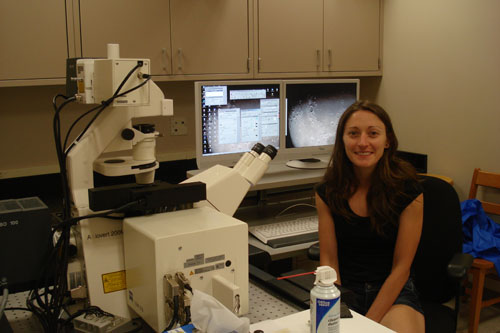Karatan Lab
Krissy Johson
Appalachian State University
Department of Biology
Rankin Science North
319 (Office), 303 (Lab)
828-262-6742

Bacterial communities in disturbed wetlands
Anthropogenic activity (road building, urbanization, mining, development) is increasing rapidly in Watauga County, NC, sometimes to the detriment of natural areas. My research focuses on a Watauga County wetland containing high levels of iron and manganese, due to recent anthropogenic disturbance. It is known that these metal ions are negatively affecting macroinvertebrate diversity and possibly bacterial diversity as well. Several locations within the wetland contain heavy orange and black deposits of iron and manganese and thick flocs of orange growth that we believe to be Leptothrix spp, a gram-negative environmental bacteria capable of oxidizing both iron and manganese. My goal is characterize the bacterial communities present in the wetland and at undisturbed reference sites, in order to further elucidate the community diversity present and to determine if the deposits in the wetland are the result of Leptothrix spp. I will do this through a combination of Restriction Fragment Length Polymorphism (RFLP) Analysis of 16S rRNA clonal libraries and through Fluorescent In-Situ Hybridization (FISH). This work is in collaboration with Dr. Michael Windelspecht, Dr. Suzanna Brauer, and Dr. Guichuan Hou, also at ASU.

Figure 1. Microbial community from one of the streambeds in the disturbed wetland. Left panel: FISH. Bacterial cells on a glass microscope slide were hybridized with FITC-labeled EUB338 universal bacterial probe. Middle panel: DIC image of the same slide. Right panel: Composite image